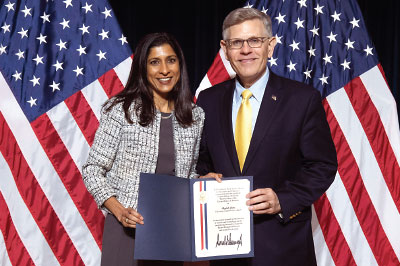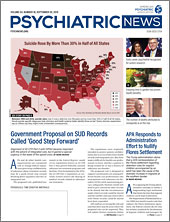For her groundbreaking work researching biomarkers for autism and other neurodevelopmental disorders, Shafali Jeste, M.D., was selected to receive the 2019 Presidential Early Career Award for Scientists and Engineers (PECASE).
Jeste, an associate professor of psychiatry, neurology, and pediatrics at the University of California, Los Angeles (UCLA) David Geffen School of Medicine, accepted the award in July. “I am excited and honored to have received the PECASE,” she told Psychiatric News.
(Another PECASE winner this year is a deputy editor of
The American Journal of Psychiatry, Carolyn Rodriguez, M.D., Ph.D.—see
Psychiatric News.
Jeste’s research focuses on finding biomarkers to help predict risk in early infancy, improve diagnosis, and detect response to treatment. “The goal,” she said, “is to start identifying babies and intervening even earlier than we do now.”
While reflecting on her career to date, she noted that “for many of us who are physician scientists, it’s a long road. The path often feels daunting at times. From the time you finish residency to your postdoctoral training to building a research program, it takes years. Being acknowledged for early success is validating.”
The PECASE is the highest honor bestowed by the federal government to outstanding scientists and engineers who are beginning their independent research careers and who show exceptional promise for leadership in science and technology. This year more than 300 engineers and scientists nationwide received the award.
Jeste is the founder and director of the UCLA Care and Research in Neurogenetics Clinic and a principal investigator at the UCLA Center for Autism Research and Treatment. She is also the principal investigator for several studies including a multisite, National Institutes of Health–funded study to identify brain biomarkers and genetic risk factors for autism and test early interventions.
In other research, she is studying autism related to the genetic disorders Dup15q syndrome and tuberous sclerosis complex (TSC). Dup15q syndrome, a neurodevelopmental disorder caused by the partial duplication of chromosome 15, is associated with the development of autism. Children with TSC have numerous noncancerous tumors in many parts of the body, including the brain, and are often diagnosed with neurodevelopmental disorders—50% have autism, and more than 75% have cognitive impairment.
“We have a research program in early infancy where we use brain markers, including EEG [electroencephalography] markers, and behavioral markers to identify the first signs of atypical development,” Jeste explained.
“EEG is a robust measure of real-time neural function. Neurons fire in synchrony, and as an assembly their firing can be detected at the scalp with EEG,” she explained. “So EEG really measures neural synchrony and integration of brain networks—processes that we know are altered in autism.”
She continued, “In the TSC trial, we are interested in whether EEG measures of neural connectivity and synchrony may change with behavioral intervention and whether these changes predict the behavioral outcomes with treatment. If this is the case, our study would be the first to show that behavioral intervention does change brain function in these high-risk infants, further reinforcing the tremendous importance of early intervention at a time when the brain is primed for plasticity.”
Jeste said that she always knew she wanted to specialize in neurodevelopmental disorders. “[As physicians], we had become very proficient in making diagnoses but struggled greatly as a field to understand cause or to determine effective and targeted treatments for these infants and children,” she said.
“In residency I began to see many children with autism and felt frustrated that, as a physician, I could not provide families with more concrete guidance about prognosis or treatment, nor could I offer much in the way of research opportunities, especially with regard to clinical trials.”
Together with her postdoctoral mentor, neuroscientist Charles Nelson, Ph.D., Jeste designed the first clinical trial of an early intervention for TSC, and “this work directly led to my receiving the PECASE award,” she said.
She added that her father, former APA President Dilip Jeste, M.D., also has been a significant influence in her career. Her father is senior associate dean for healthy aging and senior care, the Estelle and Edgar Levi Memorial Chair in Aging, a distinguished professor of psychiatry and neurosciences, and director of the Sam and Rose Stein Institute for Research on Aging at the University of California, San Diego.
“He always said that while a long, often-difficult road, research has the potential to impact thousands if not millions of people. … I think that I share in his optimism that through rigorous scientific investigation, we can make major breakthroughs in these disorders of brain function and development that have often eluded us,” she said. “The PECASE helps me to remember that my work has potential for meaningful findings down the road,” Jeste said. ■

